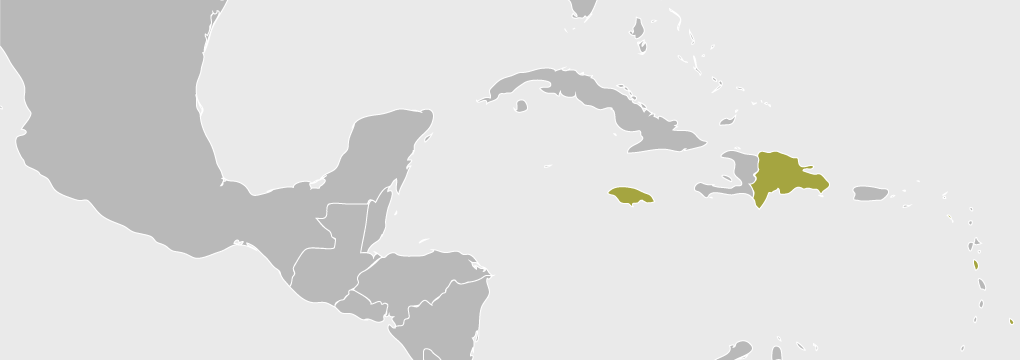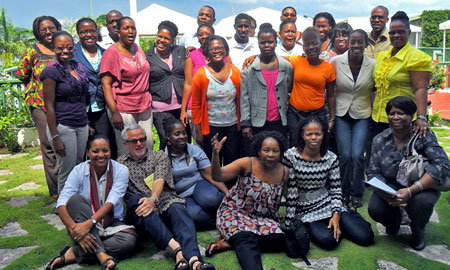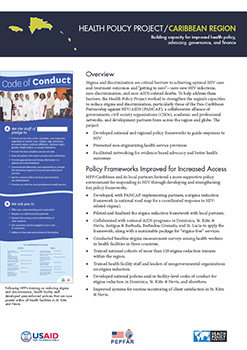The Health Policy Project ended in 2016. Work continued under Health Policy Plus (HP+) until 2022.
Caribbean Region

Country & Regional Programs
- ► Africa
- ► Asia and the Middle East
- ► Europe and Eurasia (E&E)
- ► Latin America and the Caribbean (LAC)
Overview
With an estimated 260,000 people living with HIV, the Caribbean region has some of the highest HIV prevalence levels in the world, particularly among key populations at higher risk, including sex workers and men who have sex with men. Stigma and discrimination are widely recognized as undermining efforts to prevent the spread of HIV and pose crucial barriers to accessing care and treatment services, particularly for persons living with HIV (PLHIV), as well as key populations at most risk for HIV. Persons from populations with high prevalence levels of HIV will not benefit from these life-saving services if they are denied access to them, are afraid to seek them, or experience stigma or discrimination when trying to access them.
There have been many programs addressing stigma and discrimination in the Caribbean region in an ad hoc manner. As external funding for HIV is reduced, it is a critical to assist key regional and national partners to strengthen their capacity to carry out more effective programs with the limited resources at hand. The gains made will not be lost and momentum towards an enabling environment for access to care treatment and support services lost without concerted comprehensive efforts to reduce stigma and discrimination and provide for health for all.
What We Do
The Health Policy Project (HPP) provides technical support to the stigma and discrimination program of the Pan Caribbean Partnership on HIV/AIDS (PANCAP) and affiliated regional implementing partners. HPP aims to improve regional coordination and communication about efforts to reduce HIV-related stigma and discrimination. The program also works to expand access to non-stigmatizing health services and strengthen the capacity of PLHIV and key populations at higher risk to advocate for improved HIV programs, with a focus on reducing stigma and discrimination.
HPP works with PANCAP in the development and rollout of the PANCAP Stigma Framework for HIV and AIDS, a guide for Caribbean nations to reduce HIV-related stigma and discrimination, as well as in the finalization of operational guidelines for the Regional Model Code of Practice for Psycho-Social Practitioners in HIV & AIDS Care.
Improve Coordination and Communication on HIV
HPP supports HIV policy dialogue and consultations at both national and community levels to develop a common regional advocacy agenda for addressing stigma and discrimination. In Dominica, we are working to help facilitate the development of a national HIV policy. HPP also supports community consultations in St. Kitts and Nevis on the “Equality for All” campaign to ensure equitable access to HIV-related health services and promote human rights of all persons living in St. Kitts and Nevis regardless of health status or any other perceived differences.
Improve Access to Non-Stigmatizing Health Services

Participants in workshop learn about reducing stigma in healthcare facilities.
HPP activities support partners in implementing a code of practice for HIV-related stigma reduction in healthcare settings and links to social services, helping PLHIV and other key populations at higher risk obtain the high-quality health services they need. We work with partners to help train healthcare facility workers in reducing HIV-related stigma and discrimination, and build skills for community outreach. HPP also supports mentoring of community-based organization leadership and outreach, including faith-based organizations.
Strengthen Capacity of PLHIV and Key Populations in Evidence-Based Advocacy
HPP facilitates networking among PLHIV groups and strengthens their capacity in evidence-based advocacy and policy dialogue. HPP also supports regional civil society networks to come together to share information and to develop a common regional advocacy agenda for addressing stigma and discrimination.
Publications and Resources
Building Leadership in the HIV Response in Mexico, Central America, and the Caribbean
Getting to “Stigma-Free” HIV Services in St. Kitts and Nevis: Survey Results
Video: State of HIV/AIDS in the Caribbean (PANCAP)
News
Health Policy Project Supports “Equality for All” Campaign in the Caribbean
Partners
- Pan Caribbean Partnership on HIV/AIDS (PANCAP)
- Dominica National HIV/AIDS Response Program
- St. Kitts and Nevis Ministry of Health National AIDS Program
- Caribbean HIV and AIDS Alliance
- PANCAP Regional Stigma and Discrimination Unit
- UNAIDS Caribbean Support Team
- Caribbean HIV/AIDS Regional Training Network


